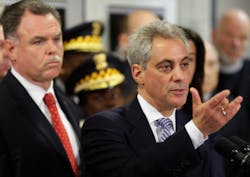Chicago Mayor Seeks Hefty Hike in Police Budget
Mayor Rahm Emanuel's 2014 budget more than doubles the amount initially set aside for police overtime this year, reflecting the increasingly high financial cost of trying to tamp down gun violence on city streets.
The new spending blueprint anticipates $71 million in overtime for police next year, compared with the $32 million the mayor budgeted for 2013 -- an estimate the city rapidly blew past in response to a wave of murders and shootings that drew unflattering national attention.
City budget director Alexandra Holt predicted that much of that 2014 overtime would be spent on saturation policing efforts in so-called impact zones, mostly South and West side neighborhoods that have borne the brunt of the bloodletting. By the time 2013 ends, Holt estimated the city would chalk up more than $40 million in overtime for impact zone policing.
To put that in perspective, Emanuel is seeking a more than $40 million hike in the police budget -- from $1.25 billion in 2013 to $1.29 billion next year -- and overtime accounts for virtually the entire increase.
Officials ramped up spending on policing in impact zones early this year in response to a wave of gun crimes, most notably the killing of teenager Hadiya Pendleton in a park not far from President Barack Obama's Kenwood home. A similar program under former Mayor Richard M. Daley was credited for reducing shootings in many violence-prone neighborhoods, but it was disbanded by Emanuel after he took office in 2011.
The price of combating violence played a critical role last summer in the decision of one key national credit rating agency to significantly downgrade the city's bond rating, an action that typically leads to higher borrowing costs.
Moody's Investors Service outlined several reasons that it had soured on Chicago, among them the city's "unrelenting public safety demands."
Emanuel has embarked on a strategy of moving police out of desk jobs and onto the streets. Yet so many older officers keep retiring that the size of the force has remained static -- even with hundreds of new recruits graduating from the police academy.
And the administration, for now at least, has determined that extra public safety needs can be met more cheaply through overtime than growing the ranks.
The costs of adding employees, including health care benefits and pension contributions, makes hiring more costly than overtime, Holt said.
But that cost-benefit analysis draws strong criticism from some in the City Council as well as from the police union.
"It doesn't hold water," said Ald. Bob Fioretti, 2nd, who said 1,000 extra officers could be hired at a cost of around $50 million annually. "The police officers are getting burned out out there. "
Mike Shields, president of the Chicago Fraternal Order of Police, warned that 3,000 sworn officers are now eligible to retire, and simply trying to patch over departures with more overtime is not wise or sustainable.
"It's not just about officers' safety," said Shields. "It's about safety of the citizens of Chicago, and despite the superintendents continuously claiming that more police officers does not equate to less crime, we say exactly the opposite. More police on the streets will equal less crime."
In his budget, Emanuel did not propose hiking property, sales or fuel taxes, major sources of revenue for the city that can prove politically sensitive. But the budget does anticipate a healthy new shot of revenue from speed camera fines.
The city expects to bring in up to $70 million in speed camera revenue, Holt said, all to be poured into children's initiatives, including violence prevention, early childhood, after-school and summer-job programs.
Although spending on those programs is being increased next year and their federal funding has been decreasing, city money already was being fed into those programs before speed cameras started generating tickets in recent weeks. So money coming from other sources that went to those programs will be freed up once the speed-camera fine spigot is opened up.
There was much in Emanuel's new budget that did meet with approval from many aldermen.
For the most part, they said they were willing to accept Emanuel's plan to raise an extra $34.2 million by increasing select taxes, fines and fees, with several noting they were pleased that he did not propose raising property, sales or fuel taxes.
Among the increases that so far have met with limited or no resistance are a 50 percent increase in the cable TV amusement tax, hikes in certain parking fines, and higher zoning application fees for large projects, as well as those filed on paper in person, rather than electronically.
The exception was the mayor's proposal to boost the cigarette tax by 75 cents a pack, which would result in a Chicago per-pack tax of $7.42 -- the highest in the nation. Aldermen and retailers said it would send people across the border to buy smokes and increase black-market sales of both full packs and loose cigarettes.
"It won't stop them from smoking, which is what our intent was in the beginning," said Ald. Carrie Austin, 34th, chairman of the Budget Committee. "I just think it will hurt sales."
The mayor, during an appearance at the Tribune editorial board, defended the tax, saying that it was a health care issue.
"I want to prevent cigarette smokers from smoking in the first place because it costs all of us a lot of money on the health care side, and whatever revenue it generates ... it will go into health care for the kids," Emanuel said.
Of the $10 million in expected new revenue from the tax, $500,000 would expand free eye care for Chicago Public Schools students. About $550,000 would be used to enroll 15,000 more children in Medicaid. The rest would be used to help balance the budget.
Copyright 2013 - Chicago Tribune
McClatchy-Tribune News Service
